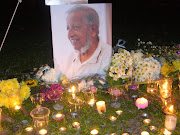Armed for a fresh battle
By NELSON BENJAMIN, 27 July 08At 82, Singapore’s veteran opposition politician J.B. Jeyaretnam has overcome the odds and a bankruptcy suit to continue his battle. Armed with a new party, his political convictions are as strong as ever.
VETERAN Singapore opposition figure J.B. Jeyaretnam
created history in
1981 when he became the first opposition MP in the island republic. The former magistrate, regarded now as Singapore's old political warrior, has paid a high price for his political convictions: he has had to sell off his properties and peddle his books along five-foot ways to help raise over S$1.5mil (RM3.45mil) to pay for at least a dozen defamation law suits against him during his 30-year political career.
The 82-year-old has now formed a new party, the Reform Party, and he hopes to continue with what he is doing as long as he is strong and healthy.
(Note: See here and here about the Reform Party)You were prohibited from active politics between 2001 and last year due to a defamation suit against you. How was it for you during this period?I was angry, I suppose. The reason was obvious, as the reason for commencing bankruptcy procedures against me was to take me out of Parliament. I tried to resist but I did not succeed. As a bankrupt I was not allowed to leave the country without getting permission from the official assignee. Even to come to Johor Baru over the weekends, I had to make an application. So there was a complete restriction on my travel. Apart from that, there were all the other little things, like you cannot have a bank account when you are a bankrupt. I was not even allowed to assist other candidates in the elections. They said I was not to go anywhere near an election rally. I was not allowed to go and speak. I was not to go and even assist any candidate because they said that was election activity and as a bankrupt I cannot do that.
How did you raise the final amount to settle your defamation suit?In the end my two sons bailed me out. The lion's share came from them. There were some small sums from others. This is because Singaporeans, for some reason or other, are frightened to give any money. Because of the climate of fear, Singaporeans did not give me much money although many sympathised with me. Most of the sales of my two books went towards my living expenses. My first book titled
Make it right for Singapore is a compilation of all my speeches in parliament. The other,
The Hatchet Man of Singapore, was after the 1997 elections. These books kept my body and soul together; they gave me something to do as besides writing them, I also sold them by the five-foot way in several areas three times a week together with a friend who has been with me since my time in the Workers Party.
Many Singaporeans were hoping you would contest in the 2006 elections. How much were you short of settling your bankruptcy amount?That was my desperate hope. If the courts had agreed to fix the amount, I could have raised it. This is why I was disappointed with the courts. If the courts had fixed the amount and I knew what I had to raise, then I might have raised it through my sons. I do not know for sure whether it was a delaying tactic.
Have you started practising since the bankruptcy order was lifted?I am doing one or two civil cases at the moment. I am operating on my own from my office off South Bridge Road. The person who was selling books is working with me now. I am here (Singapore) during weekdays.
The first thing you did after paying up your bankruptcy amount was to register a new party, the Reform Party. What was the main aim behind the formation of the party?The main thing is to restructure the way we are governed in Singapore. Call it a “system” if you like. At the moment, the way we are governed is we have the executive (the ruling People's Action Party) at the top. And it's a law unto itself. The executive makes decisions and policies without any consultation with the people. And what is worrying is that there's no check on the executive, partly because Parliament is in the control of the PAP.
And even now, with just two opposition members in parliament, Parliament passes laws and abrogates the powers of the court. The courts cannot enquire into the merits of anyone detained without trial. A number of decisions made by ministers are kept outside the courts' jurisdiction, especially decisions affecting peoples' lives. So the courts are not protecting the rights of the citizens.
There is this question of freedom of speech in assembly. The constitution grants it, but government says no. Elections in Singapore are not free and clear, as there is no election commission in Singapore. Parliament is no longer a body that is separate, independent and able to control the executive. This is what I think is the urgent priority for Singapore.
Many people retire by the age of 82 but you seem to be eager to get back in parliament this year. Why?I do expect to get back in parliament. But it's not for personal power but because I genuinely feel sorry for the people in Singapore. I am talking about the dispossessed, the underprivileged people, which make up a huge number. I am not talking about our bankers and wealthy people who are perhaps not interested in human rights. There is quite a bit of poverty in Singapore, even though the world does not seem to think so because of the propaganda machinery of the Government.
So you have no plans to retire soon?It depends on my health, but I thank God for giving me health and strength. In that sense I owe it to Him to do something.
Are you not tired of being in politics since you started in 1971 with the Workers Party (WP)?At times I feel tired and say to myself: “Don't you think you should give up now?” But that is only momentary. It is followed by the thought that if I have started on a job and as long as I have the health and strength, I will have to go on with it. And there are people who look to you especially when you walk the streets of Singapore. It is just my conviction that when things are wrong, and if there is anything I can do to put them right, then I should do that. I think every citizen should feel like that. It is a citizen's duty.
Being in the opposition in Singapore all these years has cost you dearly and you even had to sell off your properties. Any regrets?I did not have many properties but I had to sell a bungalow in a very fashionable area in Singapore to pay the judgement obtained by Minister Mentor Lee Kuan Yew. Having sold that, three years later I bought a small apartment, and then I had to sell that too. All in, I had easily about 12 to 13 suits to pay off. Some people say I was a fool. All I can say is I do not regret it because, to me, life is not all about making money and acquiring wealth. Life is doing something for the people around you.
What do you think about the recent political tsunami in Malaysia?It is good that there is a strong opposition in Parliament. This is what I am standing up for in Singapore. I want that for Singapore too.
Do you think such a political tsunami is possible in Singapore?You never know, especially if Singaporeans take to heart what has happened in Malaysia. It is good to have a strong opposition.
As you can see, former Deputy Prime Minister Datuk Seri Anwar Ibrahim is widely regarded as the person who united the opposition. Are you planning to play the same role?This talk about uniting the opposition parties in Singapore is not new. It has been talked about for many years. When I was in the WP, we managed to unite the Barisan Sosialis and another political party into one party. But before you can unite into a group, you must have similarities in ideals, objectives and values. And as I have said, even the WP now does not share my objective. Neither do the other opposition parties. So I do not see how we can really talk about coming together as one party.
In the Malaysian elections, blogs, SMS, and the Internet played an important role in getting the message across to the voters. What do you think?It goes without saying. We cannot ignore the value and importance of the Internet in Singapore. If you access the blogs in Singapore, you will see the debate that is being carried out. So, of course, it will be foolish of us if we do not resort to the Internet to convey our messages to the people.
Many Singaporeans feel that the PAP has developed the country and, as such, there is no need for an opposition. What do you think about this?Those who say this have swallowed the PAP's propaganda. No government, anywhere in the world, can be so good that there is no need for an opposition. It is only in dictatorships where one man rules the country without an opposition. And I differ (from the view) that PAP has done a lot for Singapore.
When you come to measure a country, you do not just look at the roads, the buildings, and the services provided. What you will be looking at is the quality of the peoples’ lives, whether they are allowed to live as human beings with dignity.
Singapore ranked at the bottom in a survey carried out to rank peoples’ happiness. The quality of life is poor. It is no good boasting about your efficiency, boasting about your airport, or boasting about anything else when the people are not happy.
Many say you are in constant loggerheads with the PAP and especially with the Lee family maybe because you have a personal grudge against Lee Kuan Yew.This is a load of nonsense. I am opposed to the PAP policies not because I have something against Lee personally. But he happens to be the head of the PAP, so people try and equate my dissatisfaction with the PAP with some personal animosity against Lee Kuan Yew. I am clearly opposed to all that the PAP stands for. I am against the system, not the person.
Are your sons into politics?No. They are not joining me and they have not joined any political party. But that does not mean they are not interested in political affairs and at the moment, I do not hope for them to succeed me.

















